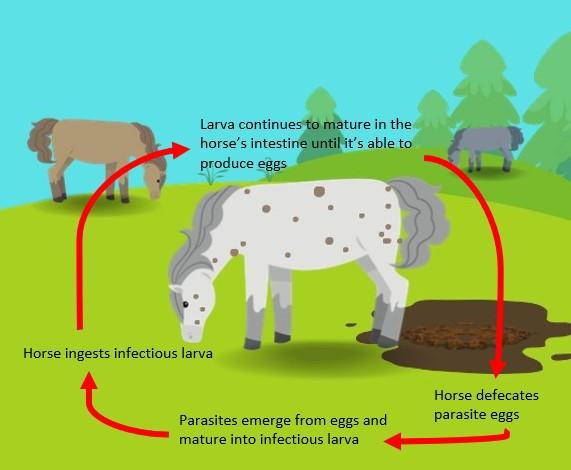The Enemy Within: Unmasking Equine Intestinal Parasites
- posted: Mar. 09, 2022
It’s the beginning of the spring season. Days are getting warmer, pastures are getting greener, and maybe you’re getting ready to welcome a foal or two. Then one day, all of a sudden, you’re precious 5-year-old show pony, Waffles, develops raging diarrhea. You immediately call your veterinarian, as you are planning to take Waffles to a horse show in a few days and he needs to be in top shape for his event.
Once your veterinarian gets to your barn, the first thing he does is ask you a few (or maybe a lot) of questions:
- When did the diarrhea start?
- What is Waffles diet and turn out routine?
- Has Waffles, or any other horse, lost some weight recently?
- Have you dewormed your horses recently?
All these questions get you thinking… You then realize that Waffles has lost a few pounds, as well as his pasture mates, Pancake and French Toast, despite having a great appetite. While talking to your veterinarian, you realize that it’s been a while since your horses were dewormed. Was it 6 months ago, or 6 years ago?
With this information, the first thing that your veterinarian recommends to solve Waffles’ diarrhea is to run a Fecal Egg Count to rule out intestinal parasites. The word parasite makes you cringe; you wonder how something so small like a parasite could cause such a horrible diarrhea to your beloved Waffles.
Intestinal Parasites Life Cycle:

Parasite larvae in the intestines are responsible for clinical disease. As part of their life cycle, they can encyst, or encapsulate, in the intestinal wall. At this stage, some commonly used antiparasitic drugs can be ineffective.
Signs of disease:
Clinical signs vary with age of the horse, type of intestinal parasite and number of parasites in the horse. Some commonly seen signs of disease include:
- Weight loss
- Diarrhea
- Colic
- Fever
- Depression
Diagnosis:
Many times, it just takes a Fecal Egg Count to assess the intestinal parasite burden in horses. This test will detect parasite eggs in the feces. The specific test is called a McMasters Fecal Float.
The goal is for each horse to have less than 200 parasite eggs per gram of feces. These horses are considered low contaminators (or low shedders) and do not necessarily need to be dewormed.
Moderate shedders have an egg per gram count between 200 to 500 eggs. It is beneficial to treat these horses with a dewormer.
High shedders will have more than 500 eggs per gram. These horses need to be treated with a dewormer.
Depending on the type of parasite and life stage they are at, a horse may have clinical disease from intestinal parasites even with a negative Fecal Egg Count. This is due to emergence of encysted parasites in the intestine that have not started to produce eggs. This is called Larval Cyathostominosis; this disease rarely occurs in horses but can be devastating. In this case, further diagnostics, such as blood work and abdominal ultrasound may be warranted.
Treatment: Whether to deworm your horse or not and which dewormer to use depends on several factors:
- Number of eggs in their feces and specific type of eggs
- Is the horse showing any clinical signs caused by parasitic infection?
- Turn-out routine and pasture management
- Age of the horse
- Time of the year
Commonly used dewormers include:
- Equimax (Ivermectin and Praziquantel): treats a variety of intestinal parasites, as well as parasites that affect other organs in the horse
- Quest (Moxidectin): can kill encysted larva in the intestine
- Panacur (Fenbendazole): can kill encysted larva in the intestine
Prevention: there are multiple key factors in the management and prevention of disease caused by intestinal parasites:
- Routine fecal egg counts: Having a fecal egg count performed every 6 to 12 months will help determine how many eggs is your horse shedding and whether it needs to be dewormed or not
- Strategic and selective deworming schedule: It is important to deworm your horse based on the number and type of parasites that it may have. It is also important to consider that parasites can develop resistance to specific dewormers. Performing routine fecal egg counts and evaluating if your current deworming protocol is effective can help determine if there is dewormer resistance or not.
- Pasture management: Intestinal parasites begin their life cycle as eggs in manure piles, and then develop into infectious larva in the pasture. Removing manure from frequently used pastures can help decrease the parasite burden in a horse. Rotating pastures and leaving pastures unoccupied for a few months can also help reduce parasite ingestion, depending on the weather and time of year, as parasite are less likely to survive in the environment during cold months.
Preventing disease in horses from intestinal worms can be easy with appropriate management and early detection of parasites. Don’t forget to request a Fecal Egg Count during your horse’s next wellness visit!
Location
Find us on the map
Browns Summit Location
5373 NC Hwy 150
Browns Summit, NC 27214, United States

